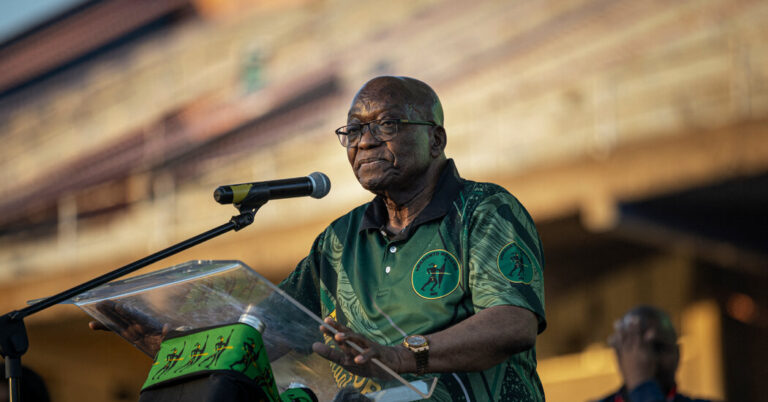The African National Congress, South Africa’s governing party announced on Monday that it had expelled the country’s former president, Jacob Zuma, officially severing ties with the once-celebrated anti-apartheid fighter after he helped form a rival political party.
Though Mr. Zuma has been a vaunted figure in the A.N.C. for decades, his tenure as president and party leader were marked by a series of corruption scandals that tarnished the party’s image. He was pressured to step down as South Africa’s president in 2018. This year, he used his broad political support to campaign for uMkhonto weSizwe, a rival party known by the initials M.K.
The rival party dealt a blow to the A.N.C. in May when it won the third-highest number of votes in the national election, keeping it from winning an outright majority for the first time since the end of apartheid 30 years ago. Mr. Zuma, 82, is now the face of M.K., which holds 58 out of the 400 seats in Parliament and appears set on challenging his former party’s grip on power.
The secretary-general of the A.N.C., Fikile Mbalula, said on Monday that Mr. Zuma had been expelled because he “actively impugned the integrity of the A.N.C. and campaigned to dislodge the A.N.C. from power while claiming that he had not severed his membership.” Mr. Zuma was given 21 days to appeal the decision.
In January, the A.N.C. suspended Mr. Zuma for what it said were “vitriolic attacks” against the party during his campaigning for M.K. Mr. Zuma maintained that his fight was to save the A.N.C. from its current leadership, which he has accused of being corrupt.
Mr. Zuma himself was not allowed to run for a seat because of a conviction and prison sentence for failing to testify before a corruption inquiry. Still, he appeared on campaign posters and on the ballot for M.K. He also led political rallies that attracted thousands of voters with his charismatic brand of populism.
As leader of the new opposition, Mr. Zuma has accused his successor and former A.N.C. deputy, President Cyril Ramaphosa, of corruption and wrongdoing. Analysts and political rivals believe that Mr. Zuma’s return to politics was driven by a desire to humiliate his former party, and particularly Mr. Ramaphosa, for not supporting him when he was arrested in 2021 on charges of contempt of court.
Mr. Zuma joined the A.N.C. as a liberation movement when he was a teenager. At 21, he was arrested by the apartheid police and spent a decade on Robben Island, serving a prison sentence alongside Nelson Mandela and other political stalwarts.
Yet under the leadership of Mr. Zuma, who was twice elected as A.N.C. president, the party lurched from scandal to scandal, and veteran freedom fighters accused him of attracting new members driven by self-interest. A yearslong corruption inquiry found that he had allowed friends and associates to loot state-owned companies.
Amelia Nierenberg and John Eligon contributed reporting.



